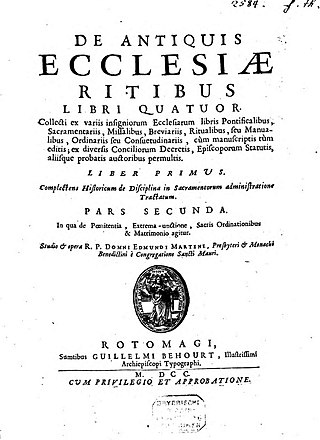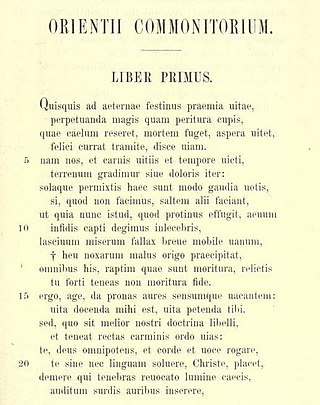This article relies largely or entirely on a single source .(July 2024) |
Saint Orientius | |
|---|---|
| Martyr | |
| Died | 5th century Rome |
| Venerated in | Roman Catholic Church |
| Canonized | Pre-congregation |
| Feast | 1 May |
Orientius was a Christian Latin poet of the fifth century.
This article relies largely or entirely on a single source .(July 2024) |
Saint Orientius | |
|---|---|
| Martyr | |
| Died | 5th century Rome |
| Venerated in | Roman Catholic Church |
| Canonized | Pre-congregation |
| Feast | 1 May |
Orientius was a Christian Latin poet of the fifth century.
He wrote the elegiac poem Commonitorium of 1036 verses (divided into two books) describing the way to heaven, with warnings against its hindrances. He was a Gaul (II, 184), who had been converted after a life of sin (I, 405 sq.), was evidently an experienced pastor, and wrote at a time when his country was being devastated by the invasion of barbarians.
All this points to his identification with Orientius, Bishop of Augusta Ausciorum (Auch), who as a very old man was sent by Theodoric I, King of the Goths, as ambassador to the Roman generals Flavius Aëtius and Litorius in 439 ("Vita S. Orientii" in "Acta SS.", I May, 61). [1]
The Commonitorium quotes classical Roman poets —Virgil, Ovid, Catullus— and is perhaps influenced by Prudentius. It exists in only one manuscript (Cod. Ashburnham. sæc. X), and is followed by some shorter anonymous poems not by Orientius, and by two prayers in verse attributed to him.
The first complete edition was published by Martène, Veterum Scriptorum Monumenta, I (Rouen, 1700); then by Andrea Gallandi, Bibliotheca veterum Patrum, X (Venice, 1774), 185–96, reprinted by J.P. Migne in Patrologia Latina 61.977-1006. The best modern edition is by Ellis in the Corpus Scriptorum Eccl. Latinorum XVI (Vienna, 1888): "Poetæ Christiani minores", I, 191–261.

Alcaeus of Mytilene was a lyric poet from the Greek island of Lesbos who is credited with inventing the Alcaic stanza. He was included in the canonical list of nine lyric poets by the scholars of Hellenistic Alexandria. He was a contemporary of Sappho, with whom he may have exchanged poems. He was born into the aristocratic governing class of Mytilene, the main city of Lesbos, where he was involved in political disputes and feuds.
The elegiac couplet is a poetic form used by Greek lyric poets for a variety of themes usually of smaller scale than the epic. Roman poets, particularly Catullus, Propertius, Tibullus, and Ovid, adopted the same form in Latin many years later. As with the English heroic couplet, each pair of lines usually makes sense on its own, while forming part of a larger work.

An epigram is a brief, interesting, memorable, sometimes surprising or satirical statement. The word derives from the Greek ἐπίγραμμα. This literary device has been practiced for over two millennia.
Latin literature includes the essays, histories, poems, plays, and other writings written in the Latin language. The beginning of formal Latin literature dates to 240 BC, when the first stage play in Latin was performed in Rome. Latin literature flourished for the next six centuries. The classical era of Latin literature can be roughly divided into several periods: Early Latin literature, The Golden Age, The Imperial Period and Late Antiquity.
Vincent of Lérins was a Gallic monk and author of early Christian writings. One example was the Commonitorium, c. 434, which offers guidance in the orthodox teaching of Christianity. Suspected of semi-Pelagianism, he opposed the Augustinian model of grace and was probably the recipient of Prosper of Aquitaine's Responsiones ad Capitula Objectionum Vincentianarum. His feast day is celebrated on 24 May.
Agathias Scholasticus was a Greek poet and the principal historian of part of the reign of the Roman emperor Justinian I between 552 and 558.

Robinson Ellis, FBA was an English classical scholar.

Blank verse is poetry written with regular metrical but unrhymed lines, usually in iambic pentameter. It has been described as "probably the most common and influential form that English poetry has taken since the 16th century", and Paul Fussell has estimated that "about three quarters of all English poetry is in blank verse".
Richard Crashaw was an English poet, teacher, High Church Anglican cleric and Roman Catholic convert, who was one of the major metaphysical poets in 17th-century English literature.

Ernest Christopher Dowson was an English poet, novelist, and short-story writer who is often associated with the Decadent movement.

Marko Marulić Splićanin, was a Croatian poet, lawyer, judge, and Renaissance humanist who coined the term "psychology". He is the national poet of Croatia. According to George J. Gutsche, Marulic's epic poem Judita "is the first long poem in Croatian", and "gives Marulić a position in his own literature comparable to Dante in Italian literature." Marulić's Latin poetry is of such high quality that his contemporaries dubbed him "The Christian Virgil." He has been called the "crown of the Croatian medieval age", the "father of the Croatian Renaissance", and "The Father of Croatian literature."

Venantius Honorius Clementianus Fortunatus, known as Saint Venantius Fortunatus, was a Latin poet and hymnographer in the Merovingian Court, and a bishop of the Early Church who has been venerated since the Middle Ages.

War poetry is poetry on the topic of war. While the term is applied especially to works of the First World War, the term can be applied to poetry about any war, including Homer's Iliad, from around the 8th century BC as well as poetry of the American Civil War, the Spanish Civil War, the Crimean War and other wars. War poets may be combatants or noncombatants.

Edmond Martène was a French Benedictine historian and liturgist.

Thomas Gale was an English classical scholar, antiquarian and cleric.
Ursin Durand was a French Benedictine of the Maurist Congregation, and historian.

John Banister Tabb was an American poet, Roman Catholic priest, and professor of English.

Artis Historicae Penus is a compilation of 18 ars historica works issued in Basel by the humanist printer Pietro Perna, This later edition appeared in 2 volumes with a copious index. A third volume adds the final work by Antonio Riccoboni. Beforehand, in 1576, Perna brought out a single volume that ran to 1140 pages and featured the Methodus ad facilem historiarum cognitionem (1566) of Jean Bodin in its title, followed by twelve other treatises. Perna writes a letter to the lover of histories. The 1576 letter of Protestant editor Johann Wolff dedicates the later collection to Frederick I, Duke of Wurttemberg. He states that he has included all the princely dedications and prefaces of the single works from the source editions for the sake of completeness.

Rossiter Johnson was an American author and editor. He edited several encyclopedias, dictionaries, and books, and was one of the first editors to publish "pocket" editions of the classics. He was also an author of histories, novels, and poetry. Among his best known works was Phaeton Rogers, a novel of boyhood in Rochester, New York, where Johnson was born.

The Commonitorium is a Latin poem composed by the Christian bishop Orientius around AD 430. Written in elegiac couplets, the Commonitorium is made up of 1036 verses and has traditionally been divided into two books. The poem is hortatory and didactic in nature, describing the way for the reader to attain salvation, with warnings about the evils of sin.